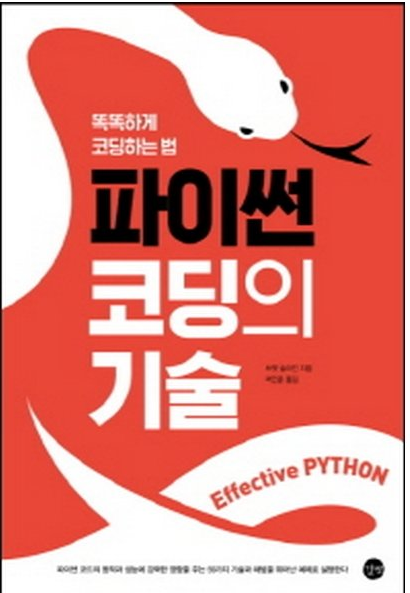
✅bytes VS str
파이썬은 문자열 데이터의 시퀀스를 표현하는 두 가지 타입이 존재하는데 그것은 bytes와 str이다.
- 부호가 없는 8바이트 데이터가 그대로 들어가고 str은 유니코드 코드 포인트가 들어간다.
(파이썬에서 str은 불변한 순서있는 집합입니다.) - 유니코드 데이터를 이진데이터로 변환하려면 str은 encode 메서드를, bytes는 decode 메서드를 호출해서 사용한다.
1. bytes 사용
- bytes를 사용하기 위해서 문자열 앞에 "b"를 입력하면 됩니다.
a = b'i am bytes'
print(a)
print(type(a))
--> b'i am bytes'
--> <class 'bytes>2. str to bytes, bytes to str
- 문자열을 encode하면 bytes형이 되고 bytes형을 decode하면 문자열이 된다.
- 인코딩 방식은 지정 가능, 일반적으로 utf-8을 사용한다.
something = 'hello world'
this = something.encode('utf-8')
print(type(this))
-> <class 'bytes'>
print(type(this.decode('utf-8')))
-> <class 'str'>✅두 개의 타입이 있을 때 발생하는 문제
파이썬으로 문자를 표현할 때마다 타입이 두 가지로 나눠져 있기 때문에 자주 발생하는 두 가지 문제가 있다.
- utf-8로 인코딩된 8비트 시퀀스를 그대로 쓰고 있을 때
- 특정 인코딩을 지정하지 안은 유니코드 문자열을 쓰고 싶을 때
1. bytes나 str을 항상 str로 반환하기
def always_str(bytes_or_str):
if isinstance(bytes_or_str, bytes):
value = bytes_or_str.decode('utf-8')
else:
value = bytes_or_str
return value
print(repr(always_str(b'foo')))
실행결과
-> 'foo'
print(repr(always_str('foo')))
실행결과
->'foo'2. bytes나 str을 항상 bytes로 반환하기
def always_str(bytes_or_str):
if isinstance(bytes_or_str, str):
value = bytes_or_str.encode('utf-8')
else:
value = bytes_or_str
return value
print(repr(always_str(b'foo')))
실행결과
-> b'foo'
print(repr(always_str('foo')))
실행결과
-> b'foo'🟢구분을 왜 해야할까?
⚠ 첫번째 문제점
얼핏 보기에는 bytes와 str은 똑같이 작동한다. 하지만 bytes와 str은 서로 다른 인스턴스이기 때문에 호환이 되지 않는다. 그래서 전달되는 문자 시퀀스 타입을 정확하게 알아야 한다.
- str과 bytes는 더할 수 없다.
- bytes와 str은 비교할 수 없다.
- 연산자는 각 타입의 형식화 문자열에 대해 작동한다.
⚠ 두번째 문제점
파일 핸들(내장함수 open)과 관련된 연산들은 디폴트로 유니코드 문자열을 요구하지 이진 바이트를 문자열을 요구하지 않는다.
with open('data.bin', 'w') as f:
f.write(b'\xf1\xf2\xf3\xf4\xf5)이런식으로 하면 에러가 발생한다. 만약 이진 데이터를 열고 쓰거나 열고 싶은면 'wb','rb'로 열어야 한다.
with open('data.bin', 'w',encoding='cp1252') as f:
f.write(b'\xf1\xf2\xf3\xf4\xf5)이러한 방식으로 인코딩 방식을 설정해서 열 수 있다.
Effective python을 참고해서 작성했습니다.
